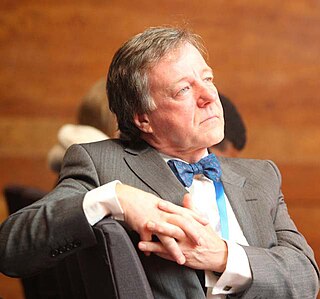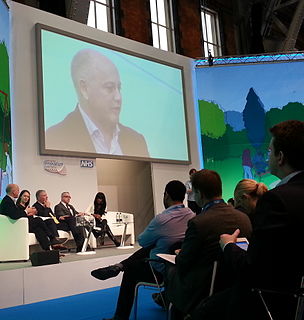Related Research Articles

The Department of Health and Social Care (DHSC) is the U.K. government department responsible for government policy on health and adult social care matters in England, along with a few elements of the same matters which are not otherwise devolved to the Scottish Government, Welsh Government or Northern Ireland Executive. It oversees the English National Health Service (NHS). The department is led by the Secretary of State for Health and Social Care with three Ministers of State and three Parliamentary Under-Secretaries of State.
General practice is the name given in various nations, such as the United Kingdom, Australia New Zealand and South Africa to the services provided by General practitioners. In some nations, such as the US, similar services may be described as family medicine or primary care. The term Primary Care in the UK may also include services provided by community pharmacy, optometrist, dental surgery and community hearing care providers. The balance of care between primary care and secondary care - which usually refers to hospital based services - varies from place to place, and with time. In many countries there are initiatives to move services out of hospitals into the community, in the expectation that this will save money and be more convenient.
St George's University Hospitals NHS Foundation Trust, formerly called St George's Healthcare NHS Trust, is based in Tooting in the London Borough of Wandsworth, and serves a population of 1.3 million across southwest London. A large number of services, such as cardiothoracic medicine and surgery, neurosciences and renal transplantation, also cover significant populations from Surrey and Sussex, totalling about 3.5 million people.
Polyclinics in England were intended to offer a greater range of services than were offered by current general practitioner (GP) practices and local health centres. In addition to traditional GP services they would offer extended urgent care, healthy living services, community mental health services and social care, whilst being more accessible and less medicalised than hospitals. A variety of models were proposed, ranging from networks of existing clinics to larger premises with several colocated general practitioner (GP) practices, more extensive facilities and additional services provided by allied healthcare professionals.

NHS Scotland, sometimes styled NHSScotland, is the publicly funded healthcare system in Scotland, and one of the four systems which make up the National Health Service in the United Kingdom. It operates fourteen territorial NHS boards across Scotland, seven special non-geographic health boards and NHS Health Scotland.
The Care Quality Commission (CQC) is an executive non-departmental public body of the Department of Health and Social Care of the United Kingdom. It was established in 2009 to regulate and inspect health and social care services in England.

National Health Service (NHS) is the umbrella term for the publicly-funded healthcare systems of the United Kingdom (UK). Since 1948 they have been funded out of general taxation. There are three systems which make up the "NHS". Health and Social Care in Northern Ireland was created separately and although it does not use the name "NHS" it is still often to referred to as such, particularly in reference to the overall health system in the UK. The four systems were established in 1948 as part of major social reforms following the Second World War. The founding principles were that services should be comprehensive, universal and free at the point of delivery—a health service based on clinical need, not ability to pay. Each service provides a comprehensive range of health services, free at the point of use for people ordinarily resident in the United Kingdom apart from dental treatment and optical care. In England, NHS patients have to pay prescription charges; some, particularly those receiving state benefits, are exempt.
IWantGreatCare is a service which allows NHS and private health care patients to rate individual GPs, hospital doctors and nursing staff on the care that they provide.

Michael Dixon LVO, OBE, MA, FRCGP was chair of the NHS Alliance from 1998 to 2015 and is a past President of the NHS Clinical Commissioners. He also chairs the College of Medicine. He is a Visiting Professor at University College London and the University of Westminster and National Clinical Champion for Social Prescribing.

Tim Kelsey is senior vice president of Analytics International at HIMSS, a global not for profit organisation which promotes digital maturity in health and care services.

Care UK is a British company providing health and social care. The company works with councils, Clinical Commissioning Groups and doctors to deliver care and support for older people and those with learning disabilities or mental health problems, as well as a range of healthcare services for NHS patients.
e-med is an online medical site based in the UK, staffed and owned by doctors. It is notable for being the first web portal to offer consultation, diagnosis, referral and prescription services to remote patients via email and Skype video conferencing, and for a controversial General Medical Council case.

Clinical commissioning groups (CCGs) are NHS organisations set up by the Health and Social Care Act 2012 to organise the delivery of NHS services in England. The announcement that GPs would take over this commissioning role was made in the 2010 white paper "Equity and Excellence: Liberating the NHS". This was part of the government's stated desire to create a clinically-driven commissioning system that was more sensitive to the needs of patients. The 2010 white paper became law under the Health and Social Care Act 2012 in March 2012. At the end of March 2013 there were 211 CCGs.

Professor Sir Anthony Herbert Everington MBBS, MRCGP,, known as Sam Everington, is a GP at a health centre within the Bromley by Bow Centre, in Tower Hamlets, an area of East London.
Healthcare in London, which consumes about a fifth of the NHS budget in England, is in many respects distinct from that in the rest of the United Kingdom, or England.
The Five Year Forward View was produced by NHS England in October 2014 under the leadership of Simon Stevens as a planning document.
EMIS Health, formerly known as Egton Medical Information Systems, supplies electronic patient record systems and software used in primary care, acute care and community pharmacy in the United Kingdom. The company is based in Leeds. It claims that more than half of GP practices across the UK use EMIS Health software and holds number one or two market positions in its main markets.

NHS Improvement (NHSI) is a non-departmental body in England, responsible for overseeing the National Health Service's foundation trusts and NHS trusts, as well as independent providers that provide NHS-funded care.

Professor Nick Harding OBE BSc FRCGP FRCP HonMFPH DRCOG DOccMed PGDIP(Cardiology) SFFLM, born 21 December 1969, is a British general practitioner and Chief Medical Officer at Operose Health.
Patient Online is an NHS England programme to encourage GPs deliver the British government’s promise to give patients in England access to their GP records and to let them book appointments and order prescriptions online.
References
- ↑ "Dr. Tom Coffey, OBE". London.gov. Retrieved 29 May 2017.
- ↑ "London leads race for GP consortia". Pulse. 17 November 2010. Retrieved 29 May 2017.
- ↑ "New care models are political vanity project, says NHS England GP". GP Online. 28 April 2017. Retrieved 29 May 2017.
- ↑ "Meet the team". BBC News. 6 May 2009. Retrieved 29 May 2017.
- ↑ "Dr Tom Coffey: Why I'm in favour of the new scheme". Independent. 19 April 2008. Retrieved 29 May 2017.
- ↑ "Advanced consulting - Consulting with patients with learning disabilities". GP Online. 2 November 2012. Retrieved 29 May 2017.